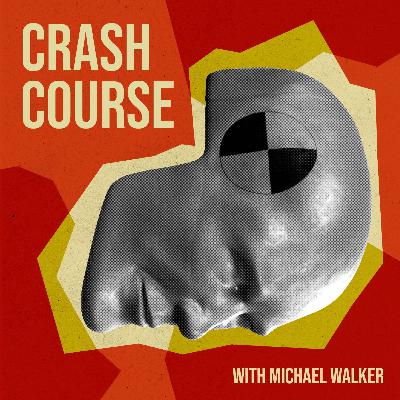Discover Crash Course With Michael Walker
Crash Course With Michael Walker

Crash Course With Michael Walker
Author: Michael Walker
Subscribed: 94Played: 2,884Subscribe
Share
© Michael Walker
Description
A crash course into the issues essential for understanding the word today.
For access to full episodes, support to the show at https://www.patreon.com/crashcoursepod
Scripting & Presenting: Michael Walker
Production & Editing: Lewis Bassett & Patrick Heardman
Sound Design: Patrick Heardman
Graphic Design: Jacek Zmarz
Hosted on Acast. See acast.com/privacy for more information.
52 Episodes
Reverse
Most of my episodes on renting have been somewhat depressing. This conversation with Ben Twomey wasn't. That's because Labour have introduced a Renters Rights Bill which - though far from perfect - could do a lot to limit the insecurity currently experienced by private renters in Britain. Ben explained what's in the bill, what's missing, and what campaigners can do to encourage this Labour government to go further for renters.Guest: Ben Twomey, Generation Rent Hosted on Acast. See acast.com/privacy for more information.
Britain's prisons were already dangerously full before the summer far-right riots. Will jailing hundreds of those rioters push the prison system over the edge? To answer that question I spoke to a fascinating guest. Ian Acheson is a former prison governor and author of the new book "Screwed: Britain's Prisons Crisis and How To Escape It"To listen to the full episode, sign up at patreon.com/crashcoursepod Hosted on Acast. See acast.com/privacy for more information.
How do the racist riots that have terrorised Britain these past two weeks fit in to a broader history of racism in Britain? In this fascinating episode I spoke to Asad Rehman, who grew up amid racist violence from the National Front in Burnley in the 1970s and 1980s, and who has spent his life since then campaigning against racism. Hosted on Acast. See acast.com/privacy for more information.
Keir Starmer and Rachel Reeves have promised that economic growth will be their number one priority. But - unwilling to spend any money - they're betting they can make this happening with costless reforms. Can planning reform deliver the goods and get Britain growing?Guest: Jonn Elledge Hosted on Acast. See acast.com/privacy for more information.
With a new government in power I'm moving from a focus on politics to one on policy, and the first topic I'm choosing for a deep is prisons. What's the extent of the crisis Labour have inherited, and how might they go about resolving it?Guest: Cassia Rowland, Institute for Government. Hosted on Acast. See acast.com/privacy for more information.
Elections in France on Sunday threw up a surprising result. Against all expectations the far-right were pushed into third place, and the left-wing New Popular Front finished with the largest number of seats. But what future faces France remains unclear. Guest: David Broder, Europe Editor at Jacobin. Editor: Liam Thorne Hosted on Acast. See acast.com/privacy for more information.
The collapse of the Tory vote and the rise of Reform means this election could prove to be historic in terms of Britain's right. To find out how Britain's conservative establishment are viewing this moment I spoke to Freddy Gray, Deputy Editor of The Spectator. Hosted on Acast. See acast.com/privacy for more information.
My episode last week with Jeremy Gilbert got a very positive response - so I thought I’d do another episode on Labour Party history.Chris Mullin was a key figure on the Labour left in the 1980s, but by 1994 he backed Tony Blair as Labour leader - and ended up taking a role as a junior minister in his governments.In this episode I ask Chris about that transition, and we also discuss Chris’s prolific career as a journalist and writer…Chris has written four novels, included “A Very British Coup. He’s also published four volumes of diaries, a memoir, and an expose of the miscarriage of judgement suffered by the Birmingham Six - who were falsely convicted of bombing by the IRA. Hosted on Acast. See acast.com/privacy for more information.
If you believe the polls, Starmer's Labour are heading for a landslide even bigger than Blair's in 1997. But that landslide, if it comes, will not be caused by any overwhelming positivity about either Starmer or Labour. Does that make the election of 2024 fundamentally different to the election of 1997? And, what consequences will that have for Starmer and Labour in government, and for Britain's left.Guest: Jeremy Gilbert. Hosted on Acast. See acast.com/privacy for more information.
**This is a free preview of a members-only episode. You can sign up at patreon.com/crashcoursepod***When most commentators discuss the Tory collapse at this election they point to three things: Boris Johnson's partygate, Liz Truss's mini-budget, and Rishi Sunak's political ineptitude. My guest on this episode has a longer term explanation for Tory collapse, and he put his money where his mouth is - publishing a book on Tory decline immediately after Boris Johnson won his stomping 2019 majority. I spoke to Phil Burton-Cartledge about how he saw the Tories days were numbered before the rest of us.Guest: Phil Burton-Cartledge, senior lecturer in sociology at Derby University and author of 'The Party's Over: The Rise and Fall of the Conservatives from Thatcher to Sunak' Hosted on Acast. See acast.com/privacy for more information.
I'll soon be moving to focus on the UK general election, but first this is a final look at a much bigger democratic contest: India's.In episode 1 and 2 of my mini-series on India's election I looked at Modi's hindu nationalism and his approach to democracy. In this third and final episode I’m taking a look at India’s economy.It's hard to overstate the significance of India's economic development. The country is home to 1.4 billion people and if as some hope it develops at the pace of its neighbour China, these are 1.4 billion people who can look forward to getting better jobs, whose children can expect decent educations, and who - in the main - can expect to gain all the privileges that come with entering the global middle class.If India fails to achieve that growth - or only achieves the wrong kind of growth - it would mean hundreds of millions of people having those ambitions stunted.Guest: Arjun Ramani, The Economist. Hosted on Acast. See acast.com/privacy for more information.
I've been wanting to get more ideological diversity and productive disagreement on Crash Course, and so I was pleased when Albie Amankona agreed to come on for an interview. Albie is a regular commentator on GB News, and vice chair of LGBT Conservatives. We discussed the council election results, how he became a conservative, the legacy of austerity, and whether he thinks his party is intentionally stoking a culture war. To listen to the full interview sign up at patreon.com/crashcoursepod Hosted on Acast. See acast.com/privacy for more information.
**This is a free preview of a longer paid episode. To sign up visit patreon.com/crashcoursepod**Given the local and mayoral elections in England and Wales I've taken a break from my India series to look at politics closer to home. In this episode I speak to George Eaton from the New Statesman about the nature of "Starmerism" and what Labour would do if - as seems very likely - they get into power at the next general election. Hosted on Acast. See acast.com/privacy for more information.
India's elections are the world's largest. But in a context in which Modi's political opponents are subject to arbitrary arrest, can we really call the country a democracy?LSE Anthropologist Alpa Shah thinks we shouldn't, and in her new book 'The Incarcerations' she explains how the arrest of 16 intellectuals and activists symbolises India's slide into authoritarianism, and even fascism.**This is a free preview of a paid episode. To listen to the full interview sign up at patreon.com/crashcoursepod** Hosted on Acast. See acast.com/privacy for more information.
To mark India's general election, I'll be doing a few episodes on the politics and economics of the world's most populous nation. In this first interview, I speak to the Oxford historian Pratinav Anil about Modi's Hindu Nationalism, and how it came to dominate politics in India.**This is a free preview of a paid episode. To listen to the full interview sign up at patreon.com/crashcoursepod** Hosted on Acast. See acast.com/privacy for more information.
In the second part of my conversation with Vincent Bevins we discussed the arab spring and the fall of the Soviet Union. The conversation includes Vincent giving a really useful explanation of the rise and fall of the Egyptian revolution, and me making a tentative case for small-c conservatism.**This is a free preview of a paid episode. To listen to all Crash Course episodes in full sign up at patreon.com/crashcoursepod** Hosted on Acast. See acast.com/privacy for more information.
Vincent Bevins is one of my favourite authors - and a good friend of mine - so I knew when I got him sat down in a room our conversation good go on for a long time. I wasn't wrong. This is the first part of a three hour conversation where we discuss his latest book "If We Burn: The Protest Decade and the Missing Revolution" . In this episode I tell Vince my doubts about the protest movements I was part of in the early 2010s, and we take a deep dive look at protest movements in Brazil and Chile.To listen to the full episode sign up at patreon.com/crashcoursepod Hosted on Acast. See acast.com/privacy for more information.
In my first crossover episode with Novara FM I spoke to Nick Bano about his new book "Against Landlords". Nick also wrote a recent piece in the Guardian which caused controversy due to Nick's unusual claim that Britain doesn't need to build more houses. I fundamentally disagree with Nick on that point, hence this became a bit of a debate!You can read Nick's Guardian piece here -> https://www.theguardian.com/lifeandstyle/2024/mar/19/end-of-landlords-surprisingly-simple-solution-to-uk-housing-crisis Hosted on Acast. See acast.com/privacy for more information.
**This is free preview of a members only episode. To listen to the full interview sign up at patreon.com/crashcoursepod**As Israel bombards Gaza, the Tory Party have used anti-war protests as an excuse to whip up a moral panic about British muslims. To discuss the long history of Tory animosity towards muslims - and the broader ideology that sees islam as a threat to the West - I spoke to Peter Oborne. Peter Oborne is the former chief political commentator at the Daily Telegraph. His most recent book is "The Fate of Abraham: Why the West is Wrong about Islam." Hosted on Acast. See acast.com/privacy for more information.
** This is a free preview of a paid episode. To listen to the full interview sign up at patreon.com/crashcoursepod **Events since October 7th have shown the strengths and weaknesses of international law. On the one hand, differing attitudes to Russia and Israel have shown the West's commitment to international law to be paper thin. On the other, cases brought to the International Court of Justice have given Palestinians a real voice in international affairs. To get a crash course on international law, how its made, who enforces it, and who can ignore it, I spoke to Alonso Gurmendi. Alonso is lecturer in international relations at Kings College London, and an expert on international law. Hosted on Acast. See acast.com/privacy for more information.
















